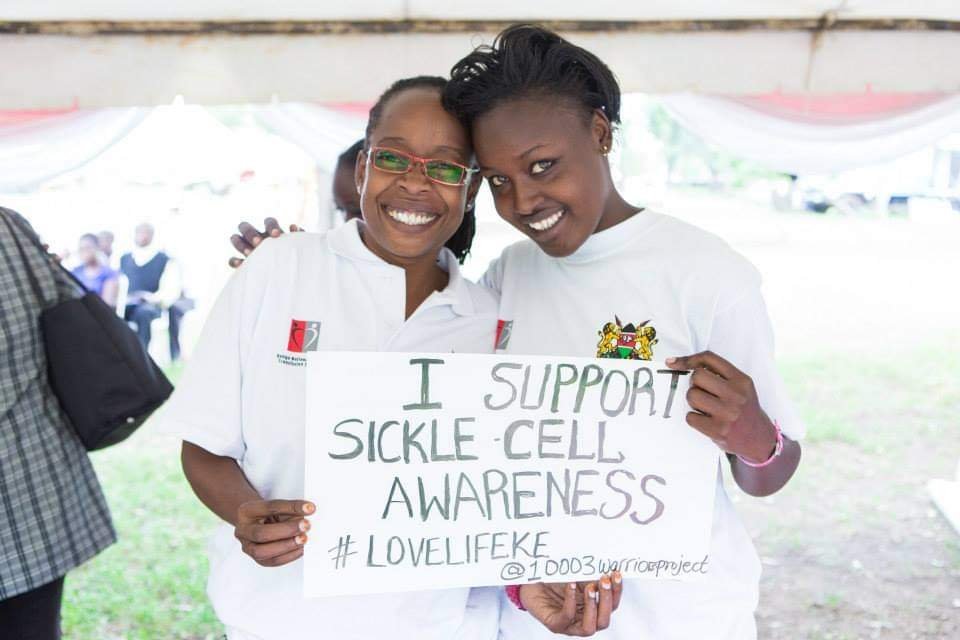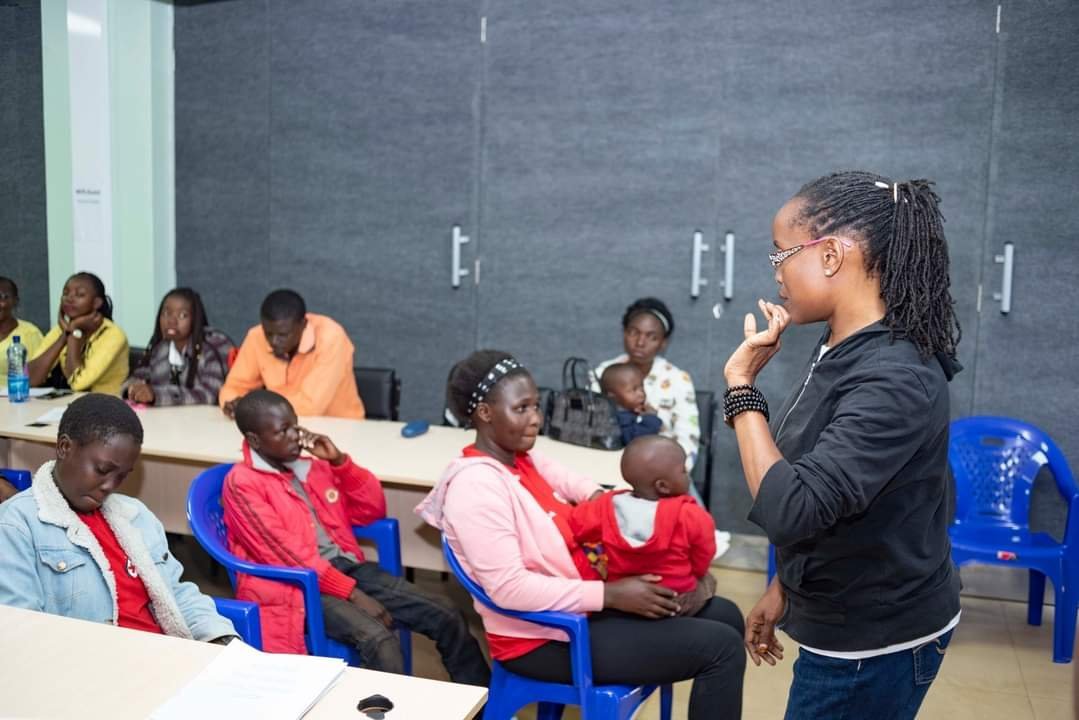From Patient to Advocate: The Story of Eunice Owino, Sickle Cell Warrior
Eunice Owino (left) promotes sickle cell awareness on World Blood Donor Day in Nakuru County, Kenya.
Voices of NCDI Poverty Advocacy Fellow Eunice Owino was just eight months old when she developed jaundice. Her parents recognized her condition with dread as a symptom of sickle cell disease. Another daughter of theirs had died from the condition before Eunice was born.
Now, successful and stronger than ever at 41 years old, Owino has defied the odds that see more than half of the approximately 1,000 children born with sickle cell disease in Africa every day die before their fifth birthday—despite the fact that with access to treatment they can live long and happy lives.
Owino, who lives in Nairobi, Kenya, has become an advocate—a “sickle cell warrior”—as the founder and leader of Sickle Cell Uhuru Trust, a platform for amplifying the voices of people living with sickle cell disease. In this article, she shares her experience living with sickle cell disease and discusses her work spreading awareness about the condition.
by Eunice Owino
Growing up, I spent a lot of time in the hospital, especially as a very young child. Those of us with sickle cell disease have to take extra care to stay healthy and avoid sickle cell crises.
Eunice Owino at age 9.
A sickle cell crisis is sharp pain in your joints. When sickle-shaped red blood cells block blood flow you will feel intense pain where the clog is. Sometimes the pain is so bad it requires a visit to the emergency room.
Sickle cell crises are often caused by sickle cell triggers, and everyone has different triggers. The best way to manage sickle cell disease is knowing your individual triggers and avoiding them.
Stress is a big trigger for me, but other triggers are strenuous exercise or swimming in cold water. The older I became, the more I knew how to manage my condition, and I was not hospitalized so much. When I lost my dad, a lot of people expected I would get sick or experience a crisis, but luckily I did fine.
A landmark moment for me as a person living with sickle cell disease was hip replacement surgery. I had been experiencing terrible pain in my hip and would sometimes wake up in the morning and my hip would lock. After 10 years of pain, finally an orthopedic surgeon diagnosed me with Avascular Necrosis (AVN) and recommended hip replacement surgery. AVN occurs when bone tissue dies due to lack of blood supply and is a morbidity of sickle cell disease.
Going through hip replacement surgery was incredibly stressful, but worth it in the end. Arranging to pay for the hip replacement surgery through insurance was difficult. If insurance companies know you have sickle cell disease, the hip replacement won’t be covered. After the surgery my doctor explained that I was not healing as well as I should have been because of all the stress, and stress is a trigger of sickle cell. In the end, I made the difficult decision to quit my job and focus on my health. After I healed, I turned my attention to my advocacy work.
A voice for sickle cell warriors
People living with sickle cell disease often refer to themselves as sickle cell warriors. We’re called sickle cell warriors because we’re fighters. Even though we experience excruciating bouts of pain, we can overcome.
We’re called sickle cell warriors because we’re fighters. Even though we experience excruciating bouts of pain, we can overcome.
We also have to fight stigma surrounding the disease, as the biggest challenge of living with sickle cell disease is discrimination. People tend to define me by my condition and characterize me as a hopeless person because of it. Not all doctors have a good understanding of the potential of a person living with sickle cell disease. But because of recent advances in medicine, like treatment with hydroxyurea, bone marrow transplants, and gene therapy, a person living with sickle cell disease can live a long and happy life. That’s why I am so passionate about educating people about what’s possible for those living with sickle cell disease. There are sickle cell warriors who are over 90 years old!
When I started my advocacy work in rural areas, I met two unrelated children whose parents were told that these children would not survive into adulthood. Neither child had ever set foot in a classroom. They were locked away with the cows because their parents were waiting for them to die and didn’t want to “waste” their money on schooling. So many people simply lack knowledge about the condition. Sickle cell disease is not a death sentence. You can live with it and manage it.
Sickle cell disease is not a death sentence. You can live with it and manage it.
I am so motivated to help people understand that children with sickle cell are normal children and need to go to school and clinic. When I came back from this visit, I realized how important it was to share my story and push forward with my advocacy work. When I meet new sickle cell parents in the ward, I hope meeting me gives them hope that their children will live a long life.
Owino working with a support group of sickle cell warriors and their caregivers at Moi Teaching and Referral Hospital in Eldoret, Kenya.
The best way to eradicate stigma is through education, so my goal as an advocate is to build awareness about sickle cell, especially among healthcare providers in rural areas. My individual advocacy project as a Voices of NCDI Poverty Advocacy Fellow was executed in Homa Bay County, a rural area of Kenya where I am from and the prevalence of sickle cell is very high. I gave a lecture on what sickle cell is to health care providers and gave tips on how they could explain sickle cell to parents, manage their patients, and administer their medicine.
I also led a workshop with patients and parents that emphasized how important it is for sickle cell patients to visit the clinic every month in order to to pick up more medicine and have a check up. This also helps patients build relationships with their doctor so their doctor becomes familiar with the triggers of each patient and the patient has a resource when they’re experiencing a crisis.
We also had sickle cell warriors share their experience living with sickle cell disease. This was especially helpful for new sickle cell parents and patients. It is vital to meet members of the community and understand that they have support in others.
Anyone can help by supporting people you meet with sickle cell, especially children. Mental health is so important, and sometimes people living with NCDs need to share their troubles in a space where they feel safe and do not have to worry about stigma from others.
The future of people living with sickle cell disease in Africa
For years, policy decisions were made that directly affected people living with sickle cell disease and other non-communicable diseases (NCDs), although people living with these conditions were not consulted. I am inspired that people living with NCDs are now sharing their experiences and needs with policy experts, so our voices are heard before these policies are put in place.
The integrated care delivery strategy PEN-Plus is a much-needed solution for the sickle cell disease community, especially on the African continent. PEN-Plus helps people living with sickle cell disease by decentralizing vital diagnosis and treatment services such as hydroxyurea, pain management, education, and counseling to rural areas where the world’s most vulnerable people live. Now, people can receive care for sickle cell disease and other NCDs closer to where they live, instead of traveling to the capital city for treatment. I hope all counties in my country, Kenya, adopt PEN-Plus so everyone who needs it has the opportunity to receive chronic NCD care close to home.
I want the world to know that sickle cell disease is not a death sentence and I want other sickle cell warriors to understand that if they take care of themselves, they can live a normal life. We can spread awareness and demand equitable access to healthcare for all through education, advocacy, and programming like PEN-Plus.
*The Voices of NCDI Poverty Advocacy Fellowship provides people with lived experience with NCDIs in the countries representing the poorest billion with mentorship, training in building successful advocacy campaigns, financial compensation, and the opportunity to take a voting role in the governance of the NCDI Poverty Network.



